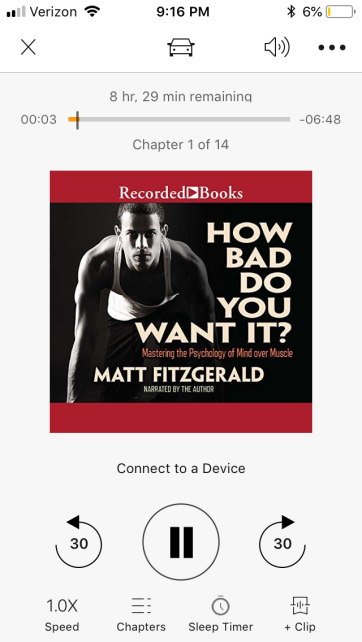
Runners: Raise your hand if you’ve been in a race and you’ve felt your mind tell you you’re going too fast, or too slow, or you get that feeling that you can’t do it. Are most of your hands up?
I know mine would be. I think a lot — too much, I would say — and I’ve thought about these things during a race. When I ran races without a watch for a year or so, I had a different experience during races, and I was faster than I am now. That’s not the only reason I was faster, but even when I try not to pay too much attention to my watch, I know it has an effect.
I listened to Matt Fitzgerald’s “How Bad Do You Want It?: Mastering the Psychology of Mind over Muscle” during and on the drive back from my trip to Vermont and New Hampshire. This was the other full book I listened to in addition to Meb Keflezighi’s “Run to Overcome: The Inspiring Story of An American Champion’s Long-Distance Quest to Achieve a Big Dream.” I also listened to part of a non-running book, “The Immortalists,” for a book club, during my driving as part of that trip.
“How Bad Do You Want It?” describes different ways in which the brain can affect an endurance race, while using real-life stories from different athletes in their competitions. I remember Fitzgerald, who narrates the book himself, saying that an athlete who had more skill could be overtaken by an athlete that was less skilled but basically able to unlock more of his or her mental capacity. Of course, they’d have to be at least relatively close — as a mid-pack runner, I’m not going to magically beat an elite at a race just because I believe in myself, for example.
Fitzgerald talks about “perceived effort,” and next time I do a race, I might think about this and consider that my body is actually capable of more than I may initially think it is. Hopefully, by the time of my next big race, the knowledge that I’ve trained well — assuming that I do, in fact, train well this time — will also help me.
I listened to this book after I ran the Vermont City Marathon, so I found myself thinking about the book in terms of the race I’d just run. Did I try hard enough?
At one point, Fitzgerald described how runners may drop from a goal once they realize they won’t hit a round number — for example, 4:00 or 4:30 for a marathon. I compared this to my own performance — I’d originally hoped to come in around 4:45 or faster, so I feel like I backed off once I realized I wasn’t going to hit 5:00, even though I still wanted to try, of course. Maybe my thoughts affected me even more than I realized.
Some of the book described technical information, but Fitzgerald does a good job explaining things for the non-psychologist. He weaves in studies, as well.
I already thought the mind was interesting, and I enjoyed learning more about how it comes into play with running, hearing Fitzgerald’s real-life stories of athletes and also thinking about these mental aspects in connection to my own life.
I haven’t run a race since the Vermont City Marathon, and I do plan to be relatively light on races this summer. However, it will be interesting to see if I can unlock something else in myself and get past mental struggles that come up on the run.
I read this book because we discussed it in the BibRave Pro book club channel, knowing that Fitzgerald would be interviewed on The BibRave Podcast. That episode recently aired — check it out here.
I listened to the book on Audible. Here’s a link to find it on Amazon/Audible (not an affiliate link). Maybe you can try your local library, as well!
That sounds really interesting!
LikeLiked by 1 person
It was!!
LikeLiked by 1 person